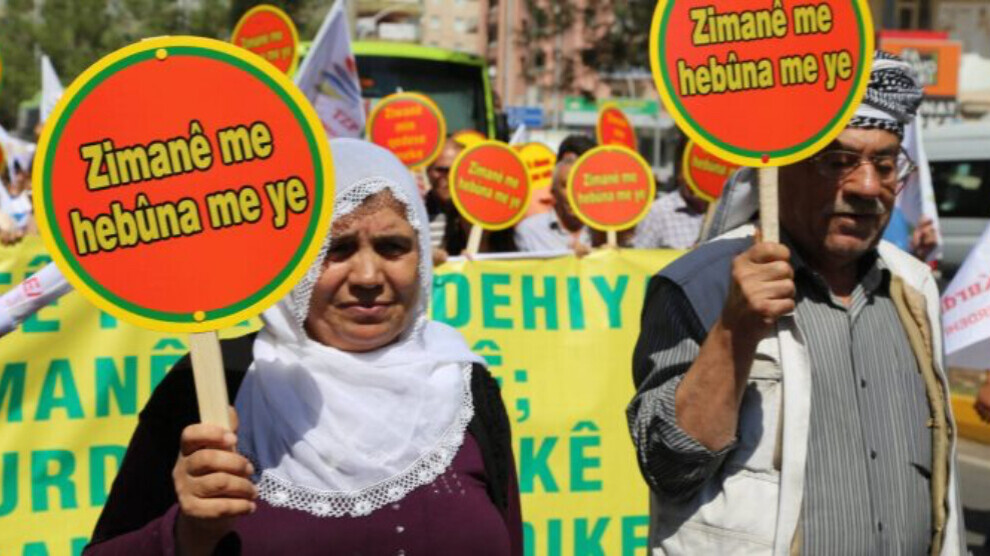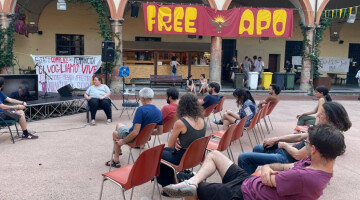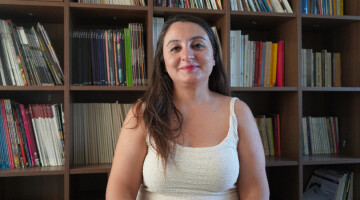The Education Committee of the KCK (Kurdistan Communities Union) released a statement on the occasion of International Mother Language Day, calling on the Kurds to continue the fight for their language, their existence, and their identity in all relevant and legal domains.
The KCK statement released on Wednesday includes the following:
“We would like to extend our congratulations on the 25th anniversary of International Mother Language Day to Rêber Apo (Leader Abdullah Öcalan), who represents the hopes of liberation for our people whose identities and languages were banned. We also express our gratitude to the martyrs who gave their lives to defend our people’s freedom, language, and existence. Moreover, to our people who, in the face of all bans, torture, lynchings, and massacres, never gave up in order to live their ‘xwebûn’ (oneself).
Each language serves as an archive for the history, culture, literature, art, and politics of the community that speaks it. We have never considered language as merely a tool for communication; rather, as a people and its organized movement fighting for independence and existence, we always believed that if we can live our language, we can use it to preserve and advance our social structure. In this way, we have viewed language as the fundamental component that unites the social consciousness, the fight to preserve culture, the fight to protect identity, and to preserve existence.
While the language revolution sparked by Kurdish women tens of thousands of years ago was a significant milestone in human history, the nation-states of today have outlawed the use of the language that our people, the revolution’s creators, knew in order to live, read, write, and conduct politics. These states have also committed crimes against language and culture by implementing laws and policies relating to monolingual education.
Our linguistic and cultural institutions, which had been established with great difficulty, have been closed down; the defense of our imprisoned people in their mother tongue has been prevented with the fascist argument of Kurdish being an ‘unrecognized’ language; proceedings have been prepared against our people for dancing halay (traditional Kurdish dance) to Kurdish music; they have been imprisoned for teaching in Kurdish; they have been killed for singing Kurdish songs.
With its nation-state understanding that grew out of the foundations of capitalist modernity, Article 42 of the fascist Turkish state’s constitution, based on the “monist” understanding, has disregarded the peoples and their languages. It forbids Kurdish education and states that “No language other than Turkish can be taught to Turkish citizens as their mother tongue in education and training institutions.” The same Turkish government has exposed hundreds of thousands of Kurdish and Arab young people living in the occupied regions of Afrin, Serêkani, and Girêspi to policies of linguistic and cultural genocide in plain sight. Likewise, an elderly Kurdish woman was detained only days ago at the Istanbul airport due to her inability to speak Turkish. Prior to this, a Kurdish theatrical performance in the city was prohibited.
Again, the theocratic Iranian regime has shown its enmity towards the Kurdish people through the imposition of monolingual education. In Rojhilat, numerous teachers, including Seywan Ibrahimi and Zara Muhammadi, were sentenced to brutal prison sentences after being tried by the Iranian state regime for threatening “national security”. The freedom to get an education in their native tongue is among the most significant and enduring accomplishments of the people of South Kurdistan (North Iraq), but in the modern day, the field of education has all but turned into a battleground for political disputes. Protests by teachers and students that have been ongoing for years in South Kurdistan are a sign of the government’s inadequate education policies and little regard for education. It is undoubtedly unrealistic to expect KDP representatives, who celebrated the 100th anniversary of the establishment of the Turkish Republic by cutting a cake in the heart of Hewlêr [Erbil], to make investments in the advancement of mother tongue education. Radical efforts should be pursued against the present system of education until results are attained, as the problems with education in South Kurdistan cannot be solved by concentrating solely on unpaid salaries.
The resistance in North Kurdistan (South-East Turkey) has asserted that the “mother tongue is a universal right and should be practiced at all levels of education.” In response to this, the fascist, racist Turkish state has reduced the status of the Kurdish language to an “elective course” in secondary education rather than protecting and recognizing it by constitution. It is important to remember that this regime previously launched TRT 6 in order to degrade Kurds in Kurdish, to air propaganda from the fascist state in Kurdish.
The KDP’s broadcasting organization Rudaw, which pawned off South Kurdistan to the Turkish state, and Hüdapar, which entered parliament today from the quota of the Hizbulkontra—once known as ‘butchers’ in North Kurdistan—are the ones hollering for this policy which reduces the right to education in the mother tongue to the status of an elective course. These groups have murdered Kurdish intellectuals, educators, students, writers, and journalists on the streets; they have tortured Kurds in acid pits. Everyone should be fully aware that the KDP is the Turkish government of South Kurdistan, and Hüdapar is the Turkish government of North Kurdistan. Both have been officially assigned as employees of the Turkish state. Today’s Hüdapar members walk through the same streets where they once shot Kurds in the back. Kurds, do not forget; those involved should know this. Neither the Kurds nor history itself forgives or forgets anything—good or bad—that has been done.
An elective course comprises a second language other than one’s native tongue. Education in the native tongue should be a right, not a favor, at all educational levels. One cannot reduce the universal right to education in one’s native tongue to the level of an elective course. Without a doubt, in response to such politics that remove individuals from the fight by gradually transforming optional courses into voluntary assimilation, our people will take a deliberate stand.
Right now, the educational model in North-East Syria is an excellent representation of the strength and determination of any people who are fighting for their existence, identity, and language both locally and globally. It serves as proof that a life, beyond the one that has been forced upon us for centuries, is possible and that we can live in harmony with our differences as a people while also valuing equality, freedom, democracy, human rights, and the advancement of children’s rights. It is also the responsibility of the Autonomous Administration of North and East Syria to support the multilingual education system and remove any barriers to its advancement.
On the occasion of International Mother Language Day, the KCK Education Committee would like to reiterate that, given the unfair circumstances in which our people are being forced into extermination and in which all international laws disregard Kurds’ birthright to an education in their mother tongue, we must continue the fight for our language, our existence, and our identity in all relevant and legal domains. There is no demand more valid than the one for education in one’s mother tongue. Speaking and writing in Kurdish should be seen by our people as the most essential way to preserve the language that is their native one, both domestically and internationally. They should also fight relentlessly to ensure that education in their mother tongue is provided, to remove any barriers to speaking their mother tongue in public settings, and to resist assimilationist policies that force linguistic homogenization. Again, we celebrate the International Mother Language Day, celebrating all those who are fighting for their native tongues.”















